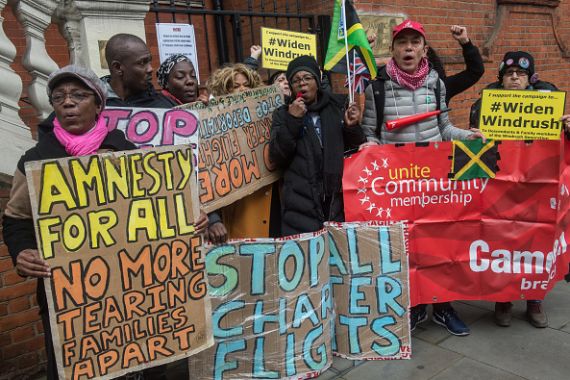Activists, Black celebrities call on UK to halt deportation plane
Dozens are to be deported to Jamaica on December 2, a move that would separate families and compromise civil liberties, according to experts.

London, United Kingdom – The UK government is under increasing pressure to halt a planned deportation flight to Jamaica with up to 50 people, a move which would separate 31 children from their fathers.
As campaigners and activists appeal to the Home Office to stop the plane scheduled to leave on December 2, 82 Black British public figures, including model Naomi Campbell, historian David Olusoga, actresses Thandie Newton and Naomie Harris, and writer Bernardine Evaristo, are urging airlines which have previously allowed such charter flights to refuse any assistance.
Keep reading
list of 3 itemsUS: Undocumented healthcare workers face deportation threat
‘Not safe to go back’: Sudanese in Israel fear deportation
The issue has also trended regularly on Twitter since the flight was announced earlier this week, under the hashtag #stoptheplane.
The Kingston-bound flight will be second deportation operation to Jamaica this year.
According to the Home Office, the flight will deport “convicted murderers and rapists”.
Under the UK law, a foreign national who has been convicted of an offence and received a custodial sentence of 12 months or more can be eligible for deportation.
But Jacqueline Mckenzie, human rights lawyer and director for the Centre for Migration Advice and Research, said the 12-month limit unjustly targeted people responsible for less serious crimes, such as a young man she represented who was deported to Jamaica in February 2019, after serving 14 months in prison for driving offences.
“The majority of people on the list are on the list for drug offences,” she told Al Jazeera.
“If you have been in the UK as a child, you shouldn’t be deported irrespective of what your offence is.
“Whether you’ve got the right documentation or not, you’re culturally British, you’re part of this society. You’ve offended here, you are punished here, and your punishment is going to prison. People should not be punished twice.”
Meanwhile, there were growing concerns over the impact of separating families.
According to the civil liberties and migrant rights group Movement for Justice, eight of the men due to be deported have 31 children between them, aged from three to 18.
Although the Home Office has said none of the deportees is eligible for the Windrush Scheme, Zita Holbourne, co-founder of the anti-racist Black Activists Against Rising Cuts organisation, said many detainees had a direct link to the Windrush generation through their parents or grandparents.
“It’s like an extension of the Windrush scandal. You’re now punishing their children and their grandchildren,” she said.
The Windrush Scheme allows Commonwealth citizens settled in the UK before January 1, 1973, who do not have documentation to prove it, to obtain evidence confirming their British citizenship free of charge.
The last chartered flight to leave for Jamaica in February this year drew concerns from lawyers after it emerged mobile phone outages had prevented deportees from accessing legal advice.
In that case, a last-minute court ruling granted a reprieve to 25 people, while 17 others were still removed.
Holbourne claimed that the detainees at Colnbrook detention centre in Middlesex, who are scheduled to be on the December 2 flight, are experiencing similar challenges.
“The computer room is locked as a COVID-19 measure. But the computer room is where you email, print, prepare your case, find a lawyer and liaise with your lawyer,” she said.
“That’s actually barring access to justice. And families aren’t allowed to visit the detention centres, which means they can’t say goodbye, which adds to that trauma and distress.”
As the UK grapples with a second wave of the coronavirus disease, the Home Office says it is taking “sensible, precautionary measures in relation to COVID-19 and immigration detention” to protect staff and detainees.
But Mckenzie and Holbourne raised concerns over the implementation of social distancing measures in detention centres, en route to the airport, and on the flight itself.
“When you get to the plane, you are shackled from the waist down and you are cuffed to two guards on either side,” said Holbourne. “[The Home Office] is saying they’re aiming for up to 50 [deportees]. Up to 50 [people] with two guards added is 150, which is a full plane, so that won’t be socially distanced.”
The announcement follows a report from the Equalities and Human Rights Commission (EHRC) earlier this week, criticising the Home Office for breaking equalities legislation with its hostile environmental policies.
EHRC said the Windrush scandal, which saw the wrongful deportation of British citizens invited to the UK between 1948 and 1971 from Caribbean countries, was a “shameful stain on British history”, adding “negative equality impacts … were repeatedly ignored, dismissed, or their severity disregarded”.
More than 6,400 “foreign national offenders” have been removed since January 2019, according to the government.
Since April, enforced returns and deportations have seen more than 30 charter flights to countries including Albania, France, Germany, Ghana, Lithuania, Nigeria, Poland and Spain.
Responding to criticism of the planned deportation, the Home Office said: “We make no apology for seeking to remove dangerous foreign criminals to keep the public safe.”
Halima Begum, director of race equality think tank Runnymede Trust, said the planned operation was a “fundamental breach of human rights” rooted in then-Prime Minister Theresa May’s “hostile environment policy” in 2012.
Back then, as she launched the policy, May said: “The aim is to create, here in Britain, a really hostile environment for illegal immigrants.”
“If this situation tells us one thing,” added Begum, “it is that the UK government has not learned from its negligence around Windrush and the hostile environment policy.”